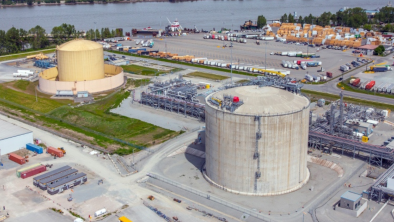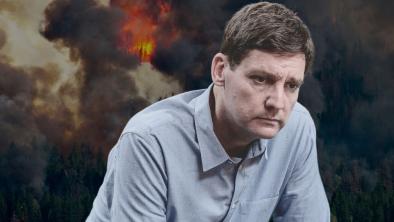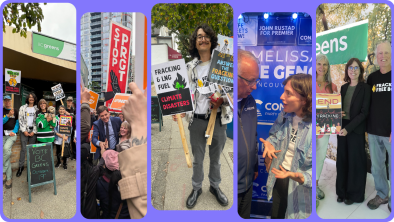The Urgent Need for A Full Public Inquiry into Fracking in BC
December 6, 2017
Honourable John Horgan, BC Premier, and
Honourable Michelle Mungall, BC Minister for Energy, Mines and Petroleum Resources
Re. The Urgent Need for A Full Public Inquiry into Fracking in BC
Dear Premier Horgan and Minister Mungall,
We write to you today as directors of numerous civil society organizations that recently issued a call for a full public inquiry into hydraulic fracturing – or fracking – in our province (see: https://www.policyalternatives.ca/newsroom/news-releases/public-inquiry-needed-properly-investigate-deep-social-and-environmental).
In response to this call, Minister Mungall has re-stated a previous NDP platform commitment to a “scientific review” of fracking in BC. We understand this review would address issues such as water impacts, seismic impacts, and GHG emissions.
While it is indeed important that these direct environmental impacts be better understood, it is our strong conviction that a scientific review is far too narrow to address the scope of what needs to come to public light. We understand that the government is currently considering appointments to a scientific panel, and plans to announce the panel early in the new year. We urge you to pause and consider the necessary scope of what requires scrutiny.
Specifically, a scientific review would fail to address:
- Clear evidence of widespread failure by oil and gas companies to consult appropriate First Nations and to respect Rights and Title.
- Growing evidence of a widespread regulatory breakdown. We now know that dozens of dams were built by energy companies, with the Oil and Gas Commission either unaware or willfully turning a blind eye until this matter was made public by the CCPA. In either case, this does not inspire public confidence that industry activities are being appropriately regulated.
- Mounting evidence that the regulator deliberately suppressed information of vital public interest. For example, in mid November the Oil and Gas Commission released an “internal” report that it had kept from the public for four years. The report documented “gas migration” at 47 known gas well sites. Gas migration can lead to groundwater contamination. The same report noted that up to 900 gas wells could be leaking gas into groundwater zones in just a portion of the area in which companies drill and frack for gas in northeast BC.
The public policy implications of withholding such information were underscored by an unfortunate exchange in the Legislature on November 20, when it was stated that fracking in BC has never resulted in water aquifer contamination. The troubling, more accurate assertion is that the OGC appears to have squelched information on potential water contamination, which has had the effect of delaying for years the kind of studies that would definitively answer if and where water contamination is occurring, and just how widespread the problem may be. The suppressed OGC report specifically notes that: “Where GM [Gas Migration] occurs from greater depths (typically thermogenic gas), there is the potential for gas to enter potable water aquifers and cause groundwater contamination.”
It is an oft-repeated point that the natural gas industry has employed fracking for decades. While technically true, this is a gross mischaracterization. Fracking of the scale and intensity now occurring is a relatively new phenomenon, well deserving of closer scrutiny.
For these reasons, we urge you to strike a broad formal Public Inquiry or Commission of Inquiry. The Inquiry must have powers and sufficient funds to compel legal testimony (under cross-examination), commission professional research, and hold public hearings across BC.
An inquiry should not be limited to scientific questions but should focus squarely on the risks associated with fracking and what should be done about them, including taking a hard look at the adequacy of provincial regulatory oversight and enforcement, and the compliance of fracking companies with existing laws and regulations.
As the Premier recently said on Voice of BC in response to a question on the regulation of the oil and gas industry, he wants to “make sure” that “enforcement and compliance” efforts in the energy sector are “done in a way that gives the public confidence.” We could not agree more with that assertion. And we believe the public would have the most confidence that the industry is being held to the highest environmental and public health and safety standards after a public inquiry has been held.
We believe a public inquiry should address fundamentally important questions such as:
- Is the natural gas industry being conducted and regulated with respect to First Nations in a manner that complies with both Canadian law and the UN Declaration on the Rights of Indigenous Peoples?
- What is the true extent of public health and safety risks associated with fracking, including the risks posed by industry-induced earthquakes?
- Where are outright bans on fracking warranted and what other steps should be taken to comprehensively protect human health and safety? In asking this question we know that your government is aware that the provincial hydro utility, BC Hydro, has already effectively achieved a ban on fracking near its Peace River hydro facilities, the most important publicly owned hydro infrastructure in our province. Where else might such bans make ecological and human health and safety sense? Near schools? Near domestic water wells? Near First Nation communities? Near other critical infrastructure such as bridges? A public inquiry is the appropriate venue to address such questions.
- What are the environmental and water impacts?
- How much could accelerated gas drilling and fracking increase BC’s overall greenhouse gas emissions and what should be done to ensure that industry emissions move steadily down, not up?
- Does BC’s Oil and Gas Commission adequately monitor the fracking industry, ensuring that it complies with all relevant laws? Is it transparent and does it keep the public fully informed?
- If current monitoring and enforcement actions are inadequate, what changes are necessary to ensure that natural gas companies comply with all relevant laws and regulations?
We believe deeply that your government’s commitment to the UN Declaration on the Rights of Indigenous Peoples, your commitment to a robust and trustworthy regulatory regime, and your commitment to openness and transparency all combine to make a full public inquiry into fracking an urgent necessity.
Thank you for your consideration.
Sincerely,
Joe Foy, National Campaign Director, Wilderness Committee
Grand Chief Stewart Phillip, President, Union of BC Indian Chiefs
Seth Klein, BC Director, Canadian Centre for Policy Alternatives
Ian Bruce, Director of Science & Policy, David Suzuki Foundation
Caitlyn Vernon, Campaigns Director, Sierra Club of BC
Brent Patterson, Political Director, Council of Canadians
Courtney Howard, President, Canadian Association of Physicians for the Environment
Jessica Clogg, Executive Director, West Coast Environmental Law
Caleb Behn, Executive Director, Keepers of the Water
Dr. Amy Lubik, Public Health Association of BC
Tracey Saxby, Executive Director, My Sea to Sky
Shannon McPhail, Executive Director, Skeena Watershed Conservation Coalition
Hilary Strang, Steering Committee Chair, Saanich Inlet Network
Valine Crist, Haida Gwaii CoASt
Margaret Ouwehand, Douglas Channel Watch
Des Nobles, Chair, Friends of Wild Salmon Coalition
Greg Knox, Executive Director, Skeena Wild


